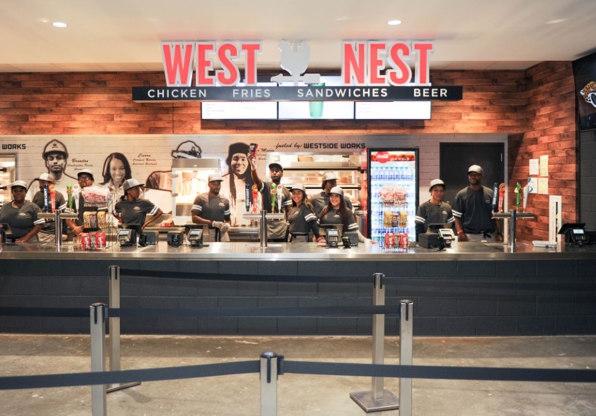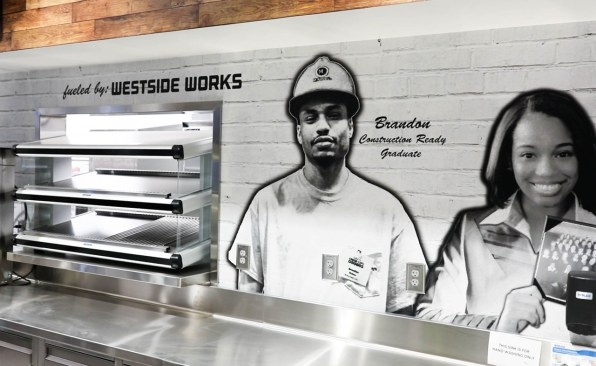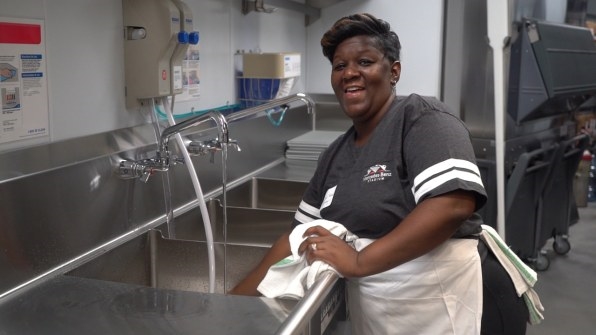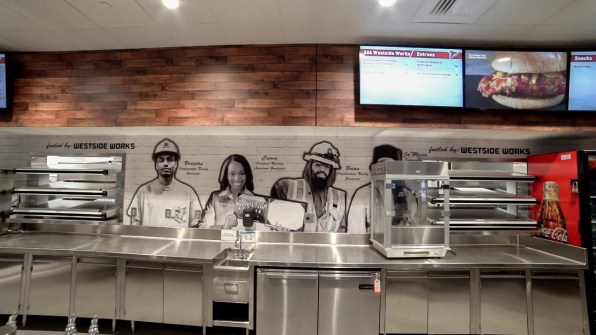In The New Atlanta Falcons Stadium, One Restaurant Has A Mission Beyond Food
The Atlanta Falcons will kick off their first home game at the city’s new Mercedes-Benz Stadium on September 17. Regardless the outcome of the game, some residents working there already feel like they’ve pulled out a win.
That’s because The West Nest, a concession stand located on the stadium’s 300-level, will be staffed entirely by local chefs who have graduated or are currently receiving a free culinary education through Westside Works, a workforce development center that’s been created as part of team owner Arthur M. Blank’s efforts to ensure the impoverished Westside neighborhood, which flanks the stadium, gets some benefit from the new arena.

Community Transformation: For Good Or Ill
Blank, the billionaire co-founder of Home Depot is doing that through contributions from his eponymous Arthur M. Blank Family Foundation, which helped launch the nonprofit Westside Works in June 2014. The concept is part of a package of revitalization ideas that Blank’s team committed to when inking the new stadium deal in early 2013.
The foundation, which promotes community building, had already spent $9 million on various green space and public health initiatives in the area in the decade before the deal was announced but sees the redevelopment deal as a chance to use the stadium itself as a tool for change. Still, that’s less than the public funding that’s been made available for the $1.5 billion showpiece. According to the Atlanta Journal Constitution, the city will provide $200 million for construction through bonds being repaid through a new lodging tax, that may generate as much as $700 million to put toward stadium operations, maintenance, and debt service over the next 30 years.
To support the stadium deal, the Blank Foundation initially agreed to contribute $15 million to the Westside Neighborhood Prosperity Fund, a sum that has since doubled to $30 million, according to an announcement put out the week before the home opener. The foundation has also spent several million more on other area transformation projects. All of this money is part of its plan to address systemic issues of poverty in the area by rebuilding community life there. In addition to the job training through Westside Works, there’s a new financial center to improve banking access and financial literacy, a new community center and youth leadership program, and increased law enforcement presence with police-designated housing.
Other economic development investors have added to the available funding, and the city of Atlanta just earmarked another $15 million toward transforming a former quarry into a lake for the city’s largest park and is paying to relocate a well-known theater company into the area.
As the New York Times reported, the entire deal has generated a mix of excitement and healthy skepticism. Stadiums can interrupt neighborhood foot traffic and are structural isolation bubbles, which means attendees may not necessarily spend more at local businesses when they go to the game. As the Times story notes, speculators have also been buying up land in the area, which is driving up real estate prices.

A Solid Job Foundation
To develop the culinary program, Westside Works partnered with Levy Restaurants, the stadium’s concessionaire company. Levy is the sports and entertainment arm of Compass, an international food service provider. Together, the groups have designed a six-week free course that covers topics like kitchen safety, knife skills, various cuisine preparations and recipe troubleshooting, and baking lessons. Each class consists of about 15 to 20 participants and fast-tracks the general culinary school formula. That includes practicing what it’s like to work in a real kitchen, including using proper kitchen terms and etiquette when collaborating with others on a cooking line.
“I just typically want everybody to have a solid foundation but then be ready to go out and be an asset for whatever chef they are going to be working with,” says the program’s culinary instructor Juliet Peters. Residents can also earn their Safe Serve Certification for proper food handling techniques, which makes them more marketable for employers.

The culinary academy is now housed inside the stadium, but ran out of the nearby Georgia World Congress Center during construction. Levy hires about 10% of its graduates, while others go on to work at about a dozen partner companies throughout the city, including the Honeysuckle Gelato, hospitality management company Legacy Ventures, the Ford Fry Restaurant Group, Georgia State University, Twin Smoker’s BBQ, and the Sheraton Atlanta. That network is important, because it allows candidates to match their strengths, financial needs, and availability to the right operator.
Westside Works, which has partnered with several community development, family work assistance, and trade education groups, offers similar job training and placement programs in construction, healthcare, IT, and child development fields. The effort stems from the Blank Foundation’s own community outreach efforts, in which it asked as many residents and local leaders as possible what might be the most helpful way to improve their lives. “We heard repeatedly that the number one priority was jobs,” says Frank Fernandez, the foundation’s vice president of community development.
The Westside, whose famed former residents include Martin Luther King Jr. (among other prominent civil rights leaders), has been in decline since the 1960s, and wasn’t helped much by its previous anchor tenant, the Georgia Dome. According to an urban planning report, the primarily African American neighborhood has a median household income of roughly $19,000. The unemployment rate, as high as 17% in 2014, is far greater than many other places around the city.
Westside Works has done something similar with its construction program, which employed graduates to help build the stadium itself. So far, the group has placed 503 participants at jobs with an average rate of $14 per hour. Its placement rate is roughly 90%, with nearly 80% of all graduates remaining employed one year after being hired. (The culinary program, which has trained 76 of those graduates, has similar numbers.) The Blank Foundation estimates that the whole jobs program has funneled $12 million in wages back into the local economy.

Game Time
Based on traffic during preseason and college football games that have already been held at the new stadium, West Nest workers this weekend will be hustling. The outpost’s 10-person game-time kitchen team serves between 1,500 to 2,000 customers per game, Peters estimates.
One of those on the line will likely be Cassandra Gee, a 33-year-old mother of three who graduated the program last November while the stadium was still under construction. She says her experience allowed her to immediately earn a job at Cheesecake Factory. “I told them about the program and… [the manager] was ready to hire me,” she says.
The only problem is reaching that job, which involved a 45-minute commute to the suburbs. Now that the stadium is open, she can work there full-time—there are enough events to ensure regular shifts in the central kitchens and at West Nest when crowds arrive.
At the same time, she’s continued to ask some of the pros that surround her more questions, extending her knowledge to everything from sauce-making to inventory tracking. The current pay may not support her family forever but with many trades securing a good job with one company can lead to opportunities and career advancement there or elsewhere. “Most of the stuff I’m learning you’d have to go to culinary school for, but this is a free education,” Gee says, noting that eventually, she hopes to open her own restaurant. “It’s wonderful. It’s a really brilliant deal.”
Peters, the culinary instructor, agrees. “It’s not just an altruistic thing, this works,” she says. “The recipe is right and peoples lives are changing.”
Correction: Due to an editing error, this article’s headline formerly erroneously referred to the new Atlanta stadium as the home of the Hawks, rather than the Falcons.
Fast Company , Read Full Story
(38)













